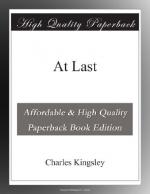Nevertheless the spy could return the candle to its place upon the table without perceptible tremor of lip or limb, and after bestowing one scrutinizing glance upon the nurse, who was fast asleep beneath it, she went to the heap of damp clothing. These she lifted—one by one—less gingerly than Phillis had done, and ransacked every likely hiding-place of papers or valuables, going through the operation with a rapid dexterity that astounded the old woman’s weak mind, and made her ashamed of her own clumsiness. Anticipating the final stealthy look in her direction, the heavy lids fell once again, and were not raised until the rusty bolt passed gratingly into the socket, and she felt that the place was deserted by all save herself and the dying stroller.
She was in no danger of dozing upon her post after this visitation. For the few hours of darkness that yet remained, she sat in her chair, her elbows upon her knees, smoking, and pondering upon what she had witnessed, varying her occupations by feeding the fire and such care of the patient as she considered advisable; likening, in her rude, yet excitable imagination, the rumbling of the gale in the chimney and across the roof-tree, to the roll of the chariot-wheels which were to carry away the parting soul; the tap and rattle of sleet and wind at the windows to the summons of demons, impatient at Death’s delay.
“The Lord send him an easy death, and let him go up, instead of down!” she groaned aloud, once.
But the dubious shake of the head accompanying the benevolent petition betokened her disbelief in the possibility of a favorable reply. In her articles of faith it was only by a miracle that a “no-account white man,” picked up out of the highway, and whose pockets were barren as were those she had examined, could get an impetus in that direction.
The stormy dawn was revealing, with dreary distinctness, the shabby disorder of the lumber-room, when Dr. Ritchie appeared in his dressing-gown, rubbing his eyes, and yawning audibly.
“Gone—hey?” was his comment upon the negress’ movements.
She had bound a strip of linen about the lank jaws; combed back the grizzled hair from the forehead into sleek respectability; crossed the hands at the wrists, as only dead hands are ever laid; straightened the limbs, and was in the act of spreading a clean sheet over her finished work.
“Nigh upon an hour since, sir,” she responded, respectfully.
“He did not revive at all after I left him?”
“Not a breath or a motion, sir. He went off at the last jist as easy as a lamb. Never tried to say nothin’, nor opened his eyes after you went down. ‘Twould a’ been a pity ef you had a’ lost more sleep a-settin’ up with him. Ah, well, poor soul! ’taint for us to say whar he is now. I would hope he is in glory, ef I could. I ’spose the Almighty knows, and that’s enough.”
The doctor arrested her hand when she would have covered the face.




